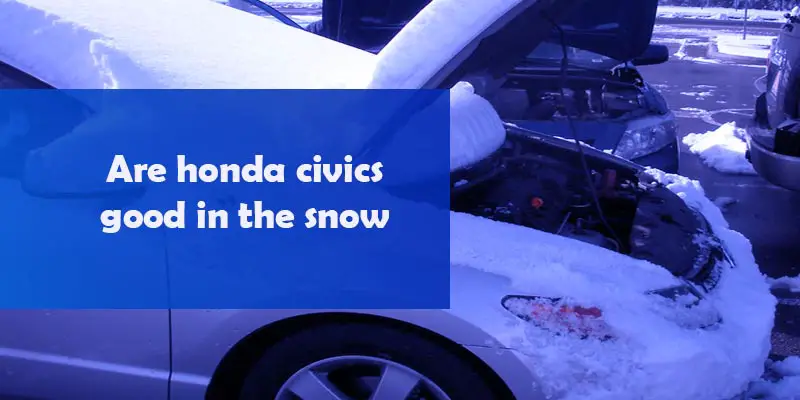Honda Civics are generally considered to be reliable and well-rounded vehicles, but their performance in the snow can vary depending on the model and the specific driving conditions.
Civic models equipped with front-wheel drive (FWD) may have better traction and handling in snowy conditions than those with rear-wheel drive (RWD) or all-wheel drive (AWD). Front-wheel drive vehicles have weight over the drive wheels which helps with traction and can make them more capable in snowy conditions.
However, even with front-wheel drive, the Civic’s performance in the snow can be greatly affected by the type of tires fitted, as well as the vehicle’s weight and suspension. Honda Civics with all-season tires, for example, may perform worse in the snow than those fitted with winter tires. The weight and suspension of the car also play a role, a lighter and more nimble car would perform better in snowy conditions than a heavier one.
It’s important to note that even the best all-season tires may not be sufficient in deep snow or icy conditions, and it’s recommended to use winter tires specifically designed for those conditions. Additionally, it’s important to drive carefully and adjust your speed and braking to suit the weather conditions.
Ultimately, while Honda Civics can perform well in snowy conditions, it’s always best to have the appropriate tires, pay attention to weather conditions and drive carefully to ensure your safety.
Which Honda is best in snow?
When it comes to Honda vehicles and their performance in the snow, one of the best options is the Honda CR-V. This compact SUV has a proven track record of being a reliable and capable vehicle in snowy conditions.
The Honda CR-V comes with standard front-wheel drive (FWD) or an optional all-wheel drive (AWD) system. The AWD option provides better traction and stability in snowy conditions and can help to improve the vehicle’s handling and performance. Additionally, the CR-V has a relatively high ground clearance, which can help to prevent getting stuck in deep snow.
Additionally, Honda’s Pilot is another solid choice for snowy conditions. It’s a larger SUV with a more powerful engine, and it also comes with an optional all-wheel drive system. With its larger size, it has more weight on the drive wheels which helps with traction.
It’s important to note that even the best vehicle will not perform well in snowy conditions if it doesn’t have the appropriate tires. It’s always recommended to use winter tires specifically designed for snowy and icy conditions. Additionally, drive carefully and adjust your speed and braking to suit the weather conditions.
Ultimately, the best Honda vehicle for snowy conditions will depend on your specific needs and preferences. It’s always best to consult with a professional mechanic or a Honda dealership for more detailed advice.
What problems do Honda Civics have?
Honda Civics are generally known for being reliable and well-built vehicles, but like any car, they can experience problems. Some common issues reported by Honda Civic owners include:
- Transmission problems: Some Honda Civic models have been known to experience transmission problems, such as slipping or rough shifting. These issues can be caused by a variety of factors, including low transmission fluid levels or worn internal components.
- Engine problems: Some Honda Civic owners have reported engine problems such as misfires, oil leaks, and reduced power. These issues can be caused by a variety of factors, such as worn spark plugs, low oil levels, or a faulty engine control module.
- Suspension problems: The Honda Civic’s suspension system can also develop problems over time, such as worn bushings, ball joints, and struts. These issues can lead to poor handling and a rough ride.
- Electrical problems: Some Honda Civic owners have reported various electrical problems, such as faulty power windows, locks, or audio systems. These issues can be caused by a variety of factors, such as worn wiring or faulty control modules.
- A/C problems: Some Honda Civic owners have reported issues with their air conditioning systems, such as poor cooling or strange noises. These issues can be caused by a variety of factors, such as low refrigerant levels, a faulty compressor, or a clogged expansion valve.
It’s important to note that these are just some of the common problems that have been reported by Honda Civic owners, and not all Civics will experience these issues. Regular maintenance and timely repairs can help to prevent or minimize these problems. Additionally, it’s always best to consult your vehicle’s owner manual or a professional mechanic for specific advice regarding your vehicle.

